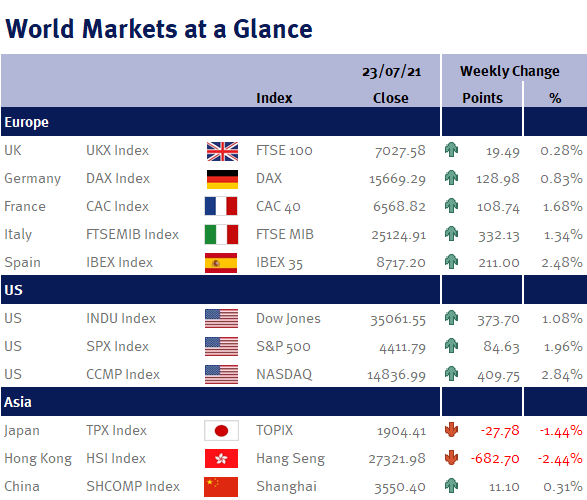Following a turbulent start, markets ended the week with a flourish, seeing the majority of major indices close higher.
Despite initial worries surrounding the Delta variant of the virus resurfacing early on, markets quickly turned their attention to the European Central Bank’s (ECB) July meeting. Whilst ECB President, Christine Largarde, announced no major changes to monetary stimulus measures, leaving the headline interest rates at -0.5% and its guidance on asset purchases unchanged, the message was one of tolerance citing caution around the delta variant of the pandemic slowing the recovery. As such, with its ultra-loose policy to remain in place until at least next year, the introduction of a “revised forward guidance” policy appeared geared around controlling the transitory inflation backdrop. This could be seen as a relatively adept move by the ECB, allowing them to control and stabilize expectation/markets, without the need for immediate policy adjustment that could see what may end up as unnecessary pressure on inflation. The ECB was clear that its revised guidance would “underline its commitment to maintaining a persistently accommodative monetary policy stance to meet its inflation target”. With the inflation target set at 2% and the current inflation levels being pressured upward in amidst of Covid and fiscal packages, Lagarde highlighted the transitory nature of current inflation. As such, the ECB is set to keep policy loose and rates low until inflation hits the 2% target, whilst also allowing prices to drift slightly over the 2% target due to its transitory nature following the adjustment of any policy mechanism. The relief injected into markets from this accommodative stance was bolstered by the release of strong PMI data on Friday (Purchasing Managers Index – the direction of economic trends in the manufacturing and service sectors), that saw it beat expectations coming in at 60.6 (over 50 means it is expanding).
Elsewhere, following the 0.5% cut to the RRR (reserve rate requirement – the amount of cash that banks must hold in reserves) in China a couple of weeks ago, it was anticipated that this week could see the PBOC (People’s Bank of China) cut the Loan Prime Rates (benchmark interest rates) in order to inject more money/spending into the economy. However, the PBOC appeared more measured and kept their benchmark interest rates unchanged, allowing time to assess the impact of the Covid Delta variant, as well as any boost in demand and consumption from the cut in the RRR. This comes in the wake of last week’s healthy Chinese retail sales, industrial production and GDP data.
There were a number of key data sets released this week. Tuesday saw the release of Japanese inflation, with CPI coming in just above par at 0.2%. However, it is today that hosts the release of the majority of the datasets. UK retail sales and consumer confidence beat expectations, and whilst UK PMIs came in slightly below expectations, they were still well into expansionary territory. Europe and the US also released their respective PMI data, both of which are significantly into expansionary territory, signalling a growing strength in the developed regions’ services and manufacturing sectors as businesses come back online following the pandemic limitations imposed on them.
With the controversial Tokyo Olympics opening ceremony set to get underway today (Friday 23rd July), it isn’t just Olympians we are looking to for some ‘record breaking’ numbers over the coming weeks! Next week we are set to see a host of corporate earnings releases for the second quarter, including Alphabet, Astra Zeneca and Facebook. Arguably the most significant event next week will be the US Federal Open Market Committee (FOMC) monthly meeting, where the focus will be on the US Federal Reserve’s decisions on interest rates, the pace of Quantitative Easing and forward guidance, in addition to their views on inflation.
Jonathan Wiseman, Fund Manager


